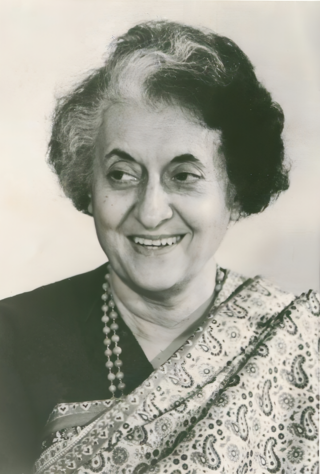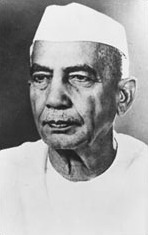
Indira Feroze Gandhi was an Indian politician who served as the third Prime Minister of India from 1966 to 1977 and again from 1980 until her assassination in 1984. She was India's first and, to date, only female prime minister, and a central figure in Indian politics as the leader of the Indian National Congress. Gandhi was the daughter of Jawaharlal Nehru, the first prime minister of India, and the mother of Rajiv Gandhi, who succeeded her in office as the country's sixth prime minister. Furthermore, Gandhi's cumulative tenure of 15 years and 350 days makes her the second-longest-serving Indian prime minister after her father. Henry Kissinger described her as an "Iron Lady", a nickname that became associated with her tough personality since her lifetime.

Morarji Ranchhodji Desai was an Indian independence activist and politician who served as the 4th Prime Minister of India between 1977 and 1979 leading the government formed by the Janata Party. During his long career in politics, he held many important posts in government such as Chief Minister of Bombay State, Home Minister, Finance Minister and 2nd Deputy Prime Minister of India.

Chaudhary Charan Singh was an Indian politician and a freedom fighter. He served as the 5th Prime Minister of India and 5th Chief Minister of Uttar Pradesh.

The Janata Party was a political party in India. It was founded as an amalgam of Indian political parties opposed to the Emergency that was imposed between 1975 and 1977 by Prime Minister Indira Gandhi of the Indian National Congress. In the 1977 general election, the party defeated the Congress and Janata leader Morarji Desai became the first non-Congress prime minister in independent modern India's history.

Sanjay Gandhi was an Indian politician and the younger son of Indira Gandhi and Feroze Gandhi. He was a member of parliament, Lok Sabha and the Nehru–Gandhi family.

Neelam Sanjiva Reddy was an Indian politician who served as the sixth president of India, serving from 1977 to 1982. Beginning a long political career with the Indian National Congress Party in the independence movement, he went on to hold several key offices in independent India — as Deputy Chief minister of Andhra state and the first chief minister of Andhra Pradesh, a two-time Speaker of the Lok Sabha and a Union Minister— before becoming the Indian president.

Bharatiya Lok Dal was a political party in India. The BLD or simply BL was formed at the end of 1974 through the fusion of seven parties opposed to the rule of Indira Gandhi, including the Swatantra Party, the Utkal Congress, the Bharatiya Kranti Dal, and the Samyukta Socialist Party. The leader of the BLD was Charan Singh.

The Indian National Congress (Organisation) also known as Congress (O) or Syndicate/Old Congress was a political party in India formed when the Congress party split following the expulsion of Indira Gandhi.

The Emergency in India was a 21-month period from 1975 to 1977 when Prime Minister Indira Gandhi had a state of emergency declared across the country.

Jagjivan Ram, known popularly as Babuji, was an Indian independence activist and politician from Bihar. He was instrumental in the foundation of the All India Depressed Classes League, an organisation dedicated to attaining equality for untouchables, in 1935 and was elected to Bihar Legislative Assembly in 1937, after which he organised the rural labour movement.

Navnirman Andolan was a socio-political movement in 1974 in Gujarat by students and middle-class people against economic crisis and corruption in public life. It is the only successful agitation in the history of post-independence India that resulted in dissolution of an elected government of the state.

Raj Narain was an Indian freedom fighter and politician. He won in a famous electoral malpractice case against the then Prime Minister Indira Gandhi, which led to her disqualification and imposition of Emergency in India in 1975. He defeated Indira Gandhi during the 1977 Lok Sabha elections.

General elections were held in India between 16 and 20 March 1977 to elect the members of the sixth Lok Sabha. The elections took place during the Emergency period, which expired on 21 March 1977, shortly before the final results were announced.

General elections were held in India on 3 and 6 January 1980 to elect the members of the 7th Lok Sabha. The Janata Party alliance came into power in the 1977 general elections amidst public anger with the Indian National Congress (R) and the Emergency. However, its position was weak; the loose coalition barely held on to a majority with only 295 seats in the Lok Sabha and never quite had a firm grip on power. Bharatiya Lok Dal leaders Charan Singh and Jagjivan Ram, who had quit the Congress, were members of the Janata alliance but were at loggerheads with Prime Minister Morarji Desai. The tribunals the government had set up to investigate human rights abuses during the Emergency appeared vindictive.

The sixth legislative assembly election of Tamil Nadu was held on 10 June 1977. All India Anna Dravida Munnetra Kazhagam (AIADMK) won the election defeating its rival Dravida Munnetra Kazhagam (DMK). M. G. Ramachandran, the AIADMK founder and a leading Tamil film actor, was sworn in as Chief Minister for the first time. The election was a four-cornered contest between the AIADMK, DMK, the Indian National Congress (INC) and the Janata Party. Earlier in 1972, M.G.R had founded the AIADMK following his expulsion from the DMK after differences arose between him and DMK leader M. Karunanidhi. On 31 January 1976, Karunanidhi's government was dismissed by the central government of Prime Minister Indira Gandhi citing non-co-operation for MISA and President's rule was imposed on the state. Karunanidhi had been at odds with Indira Gandhi over his opposition to Emergency and allied with Janata Party founded by Jayaprakash Narayan. M.G.R remained as Chief Minister until he died in 1987, winning the next two elections held in 1980 and 1984. Due to this feat, M.G.R inadvertently became an example for entry of famous actors to enter politics, with a hope that they too may become Chief minister one day. then Telugu superstar N.T.R followed M.G.R's suit in 1983 and won the Andhra Pradesh general Elections to become the Chief Minister of Andhra Pradesh. Since then, no other actor has been able to recreate M.G.R's achievements in electoral Politics.
The Congress for Democracy (CFD) was an Indian political party founded in 1977 by Jagjivan Ram. It was formed after Jagjivan Ram, Hemvati Nandan Bahuguna, and Nandini Satpathy left the Indian National Congress of Indira Gandhi and denounced her rule during the Indian Emergency. The party contested the 1977 Indian general election with the Janata alliance and later merged with it.
The Janata Morcha was a coalition of Indian political parties formed in 1974 to oppose the government of Indian Prime Minister Indira Gandhi and her Congress (R) party. The coalition was an integral part of the popular movement against the Emergency rule of Indira Gandhi and the direct predecessor of the Janata Party, which defeated the Congress (R) in the 1977 Indian general election to form the first non-Congress government in independent India. It was formed by Jayaprakash Narayan and Morarji Desai, chief of the main opposition Congress (O) party.
The State of Uttar Pradesh v. Raj Narain was a 1975 case heard by the Allahabad High Court that found the Prime Minister of India Indira Gandhi guilty of electoral malpractices. The ruling on the case that had been filed by the defeated opposition candidate, Raj Narain, Justice Jagmohanlal Sinha invalidated Gandhi's win and barred her from holding elected office for six years. The decision caused a political crisis in India that led to the imposition of a state of emergency by Gandhi's government from 1975 to 1977.
K. R. Ganesh was an Indian politician and a member of the 4th Lok Sabha and 5th Lok Sabha. He was elected to the Lok Sabha, lower house of the Parliament of India from Andaman and Nicobar Islands in the 1967 Indian general election and 1971 Indian general elections a member of the Indian National Congress. He was Minister of State in the Ministry of Finance from June 26, 1970 to October 10, 1974 and then Ministry of Petroleum and Chemicals from October 10, 1974 to December 1, 1975. He was co-founders of Congress for Democracy along with Jagjivan Ram, Hemvati Nandan Bahuguna, and Nandini Satpathy left the Indian National Congress of Indira Gandhi and denounced her rule during the Indian Emergency.
The 1977 Indian general election was held to constitute the 6th Lok Sabha. Polling was held between 16 and 20 March 1977. It was held during the Emergency period, which ceased on 21 March 1977, right before the final results were announced.















